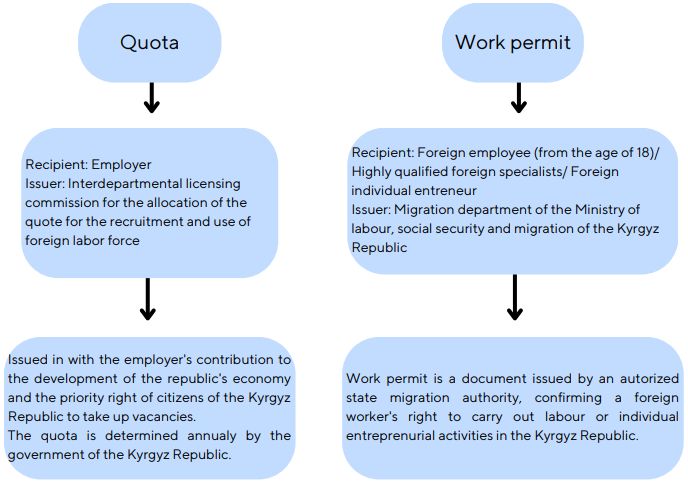In the contemporary period, there is an increasing demand for qualified specialists in different sectors of the economy of the Kyrgyz Republic. Taking into consideration that various legal issues surround the movement of the labor force across borders, one of the critical aspects of labor migration is confined within its legal framework. This article aims to explore the concept of labor migration and provide the main directions of its legal regulation within the Kyrgyz Republic. Understanding these aspects is vital for investors, employers, and individuals involved in labor migration to effectively manage and address its challenges and opportunities.
1. General terms and legal framework in labor migration
Migration legislation and international treaties are crucial for the effective regulation of labor migration. The legal framework governing labor migration outlines the rights and responsibilities of migrants and the host country, as well as prescribes specific procedural rules to safeguard the entire process. When addressing the matter of labor migration, the legal framework primarily consists of the following legal acts:
- Law of the Kyrgyz Republic dated January 13, 2006 N 4 "On external labor migration";
- Regulations on the procedure for labor activities by foreign citizens and stateless persons on the territory of the Kyrgyz Republic (to the Resolution No. 175 of the Government of the Kyrgyz Republic of 16 April 2019);
- Instruction on the procedure for processing and issuing visas to the Kyrgyz Republic (to the Resolution of the Government of the Kyrgyz Republic of 15 March 2017 No. 155)
- Treaty on the Eurasian Economic Union of 29 May 2014;
As a general rule, foreign nationals have the right to work in the Kyrgyz Republic on the basis of a legally obtained work permit. Similarly, employers in the Kyrgyz Republic have the right to employ foreign nationals based on quotas for attracting foreign labor (hereinafter referred to as "quota"). The process of obtaining a work permit and quota requires compliance with legal requirements, ensuring that migrants enter the labor market legally. The authorized state body responsible for the distribution of work permits and quotas is the Ministry of labor, social security, and migration of the Kyrgyz Republic and its respective divisions.
Quotas for attracting foreign labor are issued directly to employers by the interdepartmental licensing commission. The quota determines the maximum number of foreign nationals or stateless persons allowed to enter the Kyrgyz Republic for the purpose of carrying out labor activities. Work permits play a central role in labor migration, as they confirm a foreign employee's right to engage in labor activities within the Kyrgyz labor market. Work permits are issued directly to migrant workers or foreign individual entrepreneurs by the migration department of the Ministry of labor, social security and migration of the Kyrgyz Republic.

The requirement to obtain a work permit and quota is not universal, and its application depends on the type of labor migration and the status of the foreign employee. The current legislation of the Kyrgyz Republic distinguishes between two types of labor migration: external labor migration and pendular (border) labor migration. Each type has its own set of regulations and requirements.
External labor migration refers to the entry of foreign nationals and stateless individuals into the territory of the Kyrgyz Republic for the purpose of engaging in labor activities. This type of migration involves crossing national borders on a permanent basis and subsequently requires obtaining a work permit and quota.
On the other hand, pendular (border) labor migration refers to the entry of citizens from neighboring states into the territory of the Kyrgyz Republic to perform labor activities while maintaining permanent residence in their home state. Unlike external labor migration, pendular (border) labor migration does not require obtaining a quota and work permit. This exemption exists because cross-border migrant employees carry out their labor activities based on a self-employment patent.
It is important to emphasize that the Kyrgyz Republic is a full member of the Eurasian Economic Union (hereinafter "EAEU"). Thus, by virtue of the Treaty on Accession to the EAEU ratified by the Kyrgyz Republic, citizens of EAEU member states are exempt from obtaining work permits in the Kyrgyz Republic. Additionally, employers are entitled to hire citizens of EAEU member states without being subject to national labor market protection restrictions, i.e. without obtaining quotas.
Therefore, both citizens of EAEU member states and pendular (border) labor migrants are exempt from the requirements to obtain work permits and quotas. These exemptions align with the Kyrgyz Republic's commitment to facilitating mobility of particular employees.
2. Classification of employees involved in labor migration
- Various categories of employees are subject to different
regulations and possess distinct rights. These regulations govern
the duration of work permits, the allocation of quotas, and the
relevant financial obligations imposed on employers. By
understanding the peculiarities of these regulations, employers can
navigate the labor market and ensure compliance with the legal
framework.
- Highly qualified foreign specialists hold a unique position
within the labor market. Upon the request of their employer, they
can obtain a work permit for the duration of their employment
contract, ensuring that it does not exceed a period of three years.
This work permit is granted outside the labor migration quota,
allowing employers to hire specialized talents from abroad without
being limited by quota restrictions.
- Foreign individual entrepreneurs, on the other hand, follow a
distinct procedure. They receive a work permit for up to one year
upon their own application within the labor migration quota. In
this case, the issuance of a work permit is based on a patent
issued by the relevant Kyrgyz tax authorities. It is important to
note that foreign individual entrepreneurs are entitled to conduct
entrepreneurial activities only at the location specified in the
work permit. If a foreign individual entrepreneur wishes to engage
in entrepreneurial activities at a different location, they must
obtain a new work permit for that specific location.
- Other foreign employees can also obtain a work permit within the labor migration quota, but the duration is limited to one year. In order to maintain a balance within the labor market, the current legislation of the Kyrgyz Republic imposes a rule that the number of foreign specialists shall not exceed 20 percent of the total labor force in a particular economic entity. If the quota limit is exceeded and foreign specialists constitute more than 20 percent of the total labor force, the employer is required to pay a multiple state duty for each foreign specialist exceeding the quota limit.
3. Procedure of obtaining quota and work permit
It is necessary to underline that the process of acquiring a quota and work permit is closely connected to the visa application process. The general procedure is as follows:
- Obtaining a quota for attracting foreign labor
- Obtaining an electronic work visa to enter the
territory of the Kyrgyz Republic
- Obtaining a work permit
- Extension of the eceltronic work visa for the duration
of the work permit
- Currently, all the aforementioned procedures can be completed online. The required documents for obtaining a quota, work permit, and visa can be uploaded and processed electronically. This shift to online platforms has facilitated administrative procedures, offering a convenient and time-efficient approach for both applicants and relevant government authorities. Electronic documents hold the same status as official documents and include a readable quick response (QR) code. The specific set of required documents varies depending on the type of foreign employee. The following is a list of the necessary documents to date of the current article:
|
Obtaining a quota for |
Obtaining an electronic work visa |
Obtaining a work |
|
|
1. Ordinary |
- Application for quota; |
- Application for visa; |
- Application for work permit; |
|
2. Highly |
N.A |
Corresponding to № 1 |
Corresponding to №1 + Employment contract, |
|
3. Foreign |
N.A |
- Personal application by an |
Corresponding to №1 + Copy of a valid patent, |
In addition, when conducting the process of acquiring a quota, work
permit and visa application processes, it is important to note the
following aspects:
- The process of obtaining a work permit requires the employee to
undergo a medical examination and obtain a medical certificate for
HIV antibody testing from the Republican AIDS Centre. This
certificate should be attached to the work permit
application;
- Access to the website for submitting documents for acquisition
of work permit is granted upon crossing the border of the Kyrgyz
Republic;
- The work permit is granted after the payment of the prescribed
state fee;
- A work visa (type "W") is issued to the applicant for
the purpose of obtaining a work permit or carrying out individual
entrepreneurial activities in the territory of the Kyrgyz Republic.
This visa entitles the applicant to enter the territory of the
Kyrgyz Republic for up to 60 days, without the right to carry out
labor or selfemployment activities. When obtaining a work permit, a
work visa (type "W") is issued to the applicant - for the
duration of the work permit, but for no longer than 1 year.
- In the event that the foreign employee holds another type of visa, it is necessary to invalidate it prior to application for work visa.
In conclusion, labor migration is a significant and evolving topic in the Kyrgyz Republic. The country's legislation and international treaties play a crucial role in regulating and managing labor migration processes. Various categories of employees are subject to different regulations and possess distinct rights, which aim to balance the labor market and protect the interests of both migrants and the host country. The process of obtaining work permits, quotas, and visas has been facilitated through the use of electronic platforms, making it more convenient and efficient for applicants and relevant authorities. The Kyrgyz Republic's membership in the Eurasian Economic Union also provides exemptions and benefits for citizens of member states.
The content of this article is intended to provide a general guide to the subject matter. Specialist advice should be sought about your specific circumstances.

